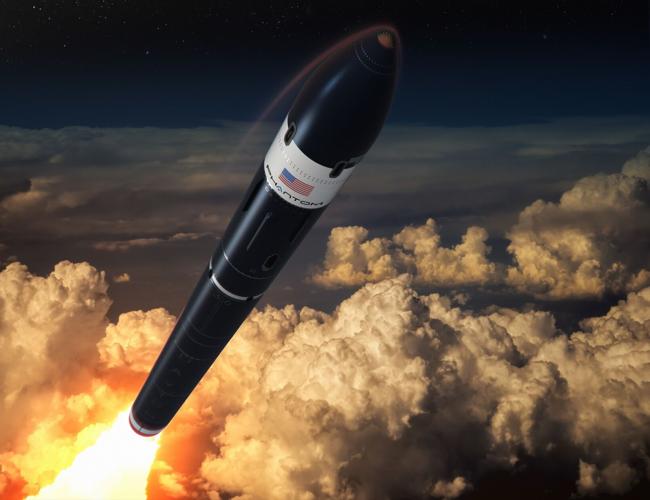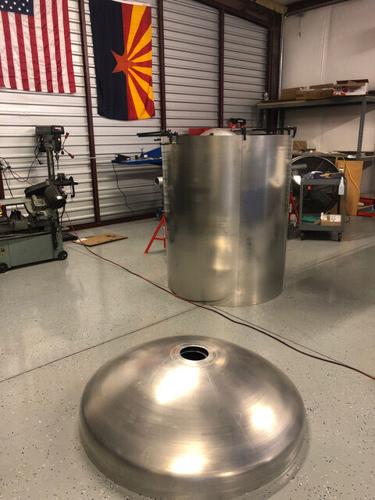Tucson’s newest small-rocket startup is expanding into a new space with plans for its first orbital flight by 2023.
Phantom Space Corp., founded by SpaceX veteran Jim Cantrell, has moved into a 32,000-square-foot building on South Research Loop, near East 22nd Street and South Pantano Road, where it is ramping up a factory to build small rockets to take micro-satellites into orbit.
The company also recently raised $5 million in private-equity seed funding and hired the former chief of Alaska’s space launch site as its head of launch operations.
Phantom, which was founded in 2019, says it’s working to “democratize space” by mass-manufacturing small rockets, satellites and space propulsion systems, with a goal of providing hundreds of small-sat launches annually.
The new Tucson factory will build Phantom’s initial Daytona rocket, and host builds for several satellite programs, as well as several other space-related classified and unclassified government projects.
The company says it plans to start testing its rocket engines later this year and work toward a first orbital launch by the first quarter of 2023.
‘Henry Ford’ of the space industry
Cantrell, who was vice president at Elon Musk’s SpaceX in the company’s early days, says Phantom’s “contrarian” approach is to use mainly off-the-shelf components to mass-produce rockets and space vehicles.
“We want to be the Henry Ford of the space industry with mass production, while others in this space are focused on vertically integrating their technology and supply chain,” Cantrell said, adding that combining mature technologies with Phantom’s own innovations will help it reach orbit faster.
That strategy is a departure from that of Cantrell’s last Tucson-based rocket startup, Vector, which tried to perfect a proprietary rocket-engine technology but failed in 2019 when a major investor withdrew its support. Vector’s launch assets were acquired in a bankruptcy auction by investors and the company is restarting testing in Tucson with different engines.
Phantom’s two-stage Daytona rocket is powered by eight engines built by Colorado-based Ursa Major Technologies. The engines have been qualified for flight, though they have not yet been flown.
The Daytona is about 61 feet long and will be capable of launching nearly 1,000 pounds into low-Earth orbit at a cost of $4 million per mission, the company says. Phantom also is developing the larger Laguna rocket, with more than twice the payload capacity of the Daytona.
Phantom, which now has more than 25 employees, says it is building four initial Daytona vehicles and is focused on securing more launch sites, after recently lining up a site at Vandenberg Space Force Base in California.
The company says it is building an imaging satellite for a commercial customer who will be using the imagery “in support of United States Department of Defense core missions.”
In less than two years, the company says, Phantom has more than $100 million in pre-sold satellite launch and satellite manufacturing contracts.
Looking to launch
Phantom announced on June 15 that it hired Mark Lester, who most recently headed operations at the Pacific Spaceport Complex-Alaska as CEO of the state-run Alaska Aerospace Corp., as its vice president of launch operations.
Lester, a veteran aerospace and defense industry executive and consultant, said he knew of Cantrell from his 30 years in the space industry and was discussing career opportunities with him when Cantrell invited him to join Phantom.
Lester said Phantom’s concept of mass production and its goal of high launch rate, coupled with the deep space-industry experience of Cantrell and Phantom co-founder Michael D’Angelo, attracted him to the venture.
“There’s a lot of things from the past we can do better and improve on,” said Lester, who starts his duties in July. “I think the market is emerging in commercial space, and it will grow quite a bit here as we have more vehicles that can reach space.”
He likened the small-sat launch business to the advent of the smart phone, which drove applications no one had thought of when internet-connected phones first arrived.
Lester said Phantom’s initial launch-site agreement with Vandenberg is just the first of several launch locations he hopes to line up both in the U.S., which has a dozen federally-approved launch sites, and in other countries.
“We’re going to need a network of launch sites,” Lester said, noting that geography related to desired satellite orbits will dictate launch locations.
“We’ll start out with a handful, and build out sites that complement each other,” he said, noting that small rockets are typically launched from portable launch rigs.
Raising money, tech
While Phantom still has a long way to go to reach orbit, investors gave the company a vote of confidence in April with a $5 million seed investment round led by New York-based Chenel Capital.
“Phantom Space is among the best-positioned space startups to democratize access to space,” Richard Chenel, founder and managing partner at Chenel Capital, said at the time, citing the company’s growing pipeline of government and commercial customers.
Phantom also recently shored up its technology resources.
In late May, Phantom acquired Strategic Space Development, or StratSpace, a satellite technology company Cantrell founded in 2000.
StratSpace has had engineering roles in 46 satellite and spaceflight programs, including the Lightsail “solar sail” programs sponsored by The Planetary Society, imaging satellites launched by the former Skybox Imaging, the Iridium Next communications satellite constellation and numerous Defense Department satellite systems.
StratSpace’s clients have included NASA, Lockheed Martin, Boeing, Northrop Grumman and Orbital Sciences.





